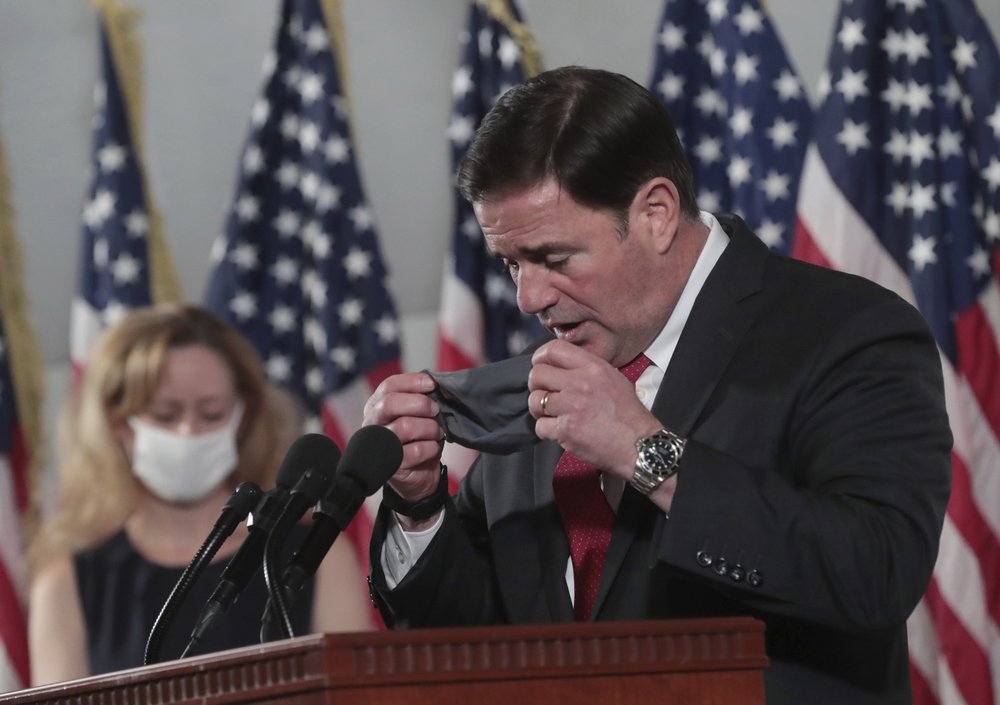PHOENIX (AP) — Arizona Gov. Doug Ducey has funneled nearly $400 million of federal coronavirus relief funds to state agencies to help pay for operations, allowing them to return some of their original budget allocations to the state treasury.
Ducey’s office touts that move as prudent budgeting that will help the state avoid a severe fiscal crunch but it stretches federal rules on how states can use the federal money, the Arizona Capitol Times reported.
Congress didn’t allow states to use Coronavirus Aid, Relief, and Economic Security Act money to replace revenue lost because of the pandemic, and Jared Walczak, vice president of state projects at the Tax Foundation’s Center for State Tax Policy, said some states have chosen to liberally interpret guidance provided by the U.S. Treasury Department.

“Most states have avoided what might be interpreted as directly disregarding the guidance, but many have been flexible in the interpretation of that guidance in hopes that ultimately the Treasury will be similarly flexible in the accountability standards,” Walczak said. “Nonetheless, what’s being proposed in Arizona is a very aggressive interpretation.”
Arizona received more than $4 billion under the act, and Ducey has wide latitude over how to spend nearly $1.9 billion, nearly a quarter of the total.
Ducey’s office is confident that it used the money properly, said Matt Gress, the governor’s budget director.
“There’s always a chance that the auditors come back and say, ‘We need a little bit more clarification on X, Y and Z,’” Gress said. “But I don’t see a scenario in which they say, ‘Return this money,’ because we followed the guidance as clearly as we could.”
Ducey funneled about $396 million to the Department of Economic Security, the Department of Health Services and nine other agencies to pay for expenses such as salaries, and the agencies will deposit $300 million back into the state’s General Fund and $96 million into other funds.
Some agencies, such as Health Services, have a clear connection to the pandemic. For others, Ducey’s office relied on guidance from the U.S. Treasury Department that says payroll for public health and public safety employees could be presumed to be related to the pandemic and therefore eligible to be funded by the CARES Act.
Using federal money to pay for expenses that otherwise would have been covered by the state has helped stabilize the state’s budget so Arizona doesn’t have to cut spending from programs such as education and public safety, Ducey spokesman Patrick Ptak.
“I would add that we know the pandemic isn’t just about the public health response,” Ptak said.
Arizona on Friday reported more than 4,000 additional known COVID-19 cases for the third time in a week as related hospitalizations continued to increase.
The state’s coronavirus dashboard reported 4,314 additional cases and 20 deaths, increasing the state’s totals to 318,638 cases and 6,588 deaths.
The dashboard reported that 2,301 people were hospitalized for COVID-19 as of Thursday, including 532 in beds in intensive-care units.
The number of infections is thought to be far higher than reported because many people have not been tested, and studies suggest people can be infected with the virus without feeling sick.
For most people, the new coronavirus causes mild or moderate symptoms, such as fever and cough that clear up in two to three weeks. For some — especially older adults and people with existing health problems — it can cause more severe illness, including pneumonia, and death.
Arizona officials on Friday ordered a Scottsdale gym to close for failing to comply with health measures meant to control the spread of COVID-19.
Arizona Department of Health Services officials said Self Made Training Facility in Scottsdale has not filed paperwork agreeing to limit capacity and abide by other safety measures. That’s required for gyms to operate in Arizona under a series of emergency orders by Ducey and health department Director Dr. Cara Christ.
The DHS closure order says Scottsdale police have cited gym owner Jeffrey Mahaffey seven times for failing to obey an emergency management order. Mahaffey could not immediately be reached through the phone number and email form on the gym website.








